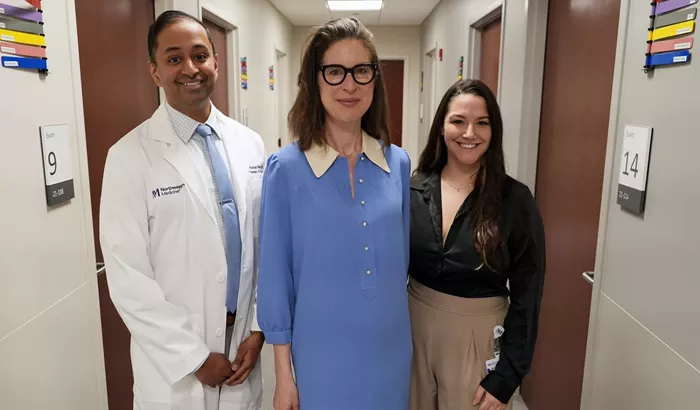A German woman, Cornelia Tischmacher, has made an incredible recovery after undergoing a groundbreaking double-lung transplant surgery that rid her of advanced lung cancer.
Tischmacher, a 40-year-old art dealer and historian from Berlin, was diagnosed with stage 3 lung cancer in early 2018, just months after giving birth to twins.
Despite having surgery and chemotherapy, her cancer returned the following year, and by June 2024, her lung function had deteriorated to the point where she required an oxygen tank to breathe.
With limited options remaining, Tischmacher learned about an innovative clinical trial in the United States, aimed at helping patients like her. The trial, called the DREAM (Double Lung Transplant Registry Aimed for Lung-Limited Malignancies) program at Northwestern Medicine in Chicago, offers a new approach to double-lung transplants for patients whose cancer is confined to the lungs.
Dr. Ankit Bharat, chief of thoracic surgery at Northwestern Medicine, and his team had developed a method that removes both cancerous lungs at once, thoroughly cleans the chest cavity, and then implants healthy lungs. This approach was designed to minimize the risk of cancer spreading during the transplant, a problem with traditional methods where the lungs are transplanted one at a time.
In December, Tischmacher flew to Chicago for the surgery. When she woke up, she could breathe without an oxygen tank for the first time in years. Five months later, her health continues to improve, and there are no signs of cancer.
Tischmacher’s case is part of a promising new approach for patients with advanced cancer confined to the lungs, particularly those with strong heart and kidney function. Since the DREAM program began three years ago, 70 patients have undergone the procedure, with only five experiencing a recurrence of cancer.
While lung transplants are rare, this innovative surgery offers hope for patients who would otherwise have no options. Tischmacher, the first patient from Germany to receive this transplant, plans to stay in the U.S. for a year to continue her recovery before returning to Germany.
Thanks to the surgery, Tischmacher can now enjoy everyday activities with her eight-year-old twins, something she struggled with before. Her story offers new hope to those battling advanced cancers, showing that even in the most dire situations, medical breakthroughs can offer a second chance at life.
Related topics:
- Rising Lung Cancer Rates In Women: What You Need To Know
- Women Face Longer Wait Times And Higher Mortality In Lung Transplantation
- Women Face Higher COPD Risk Than Men—Even Without Smoking


